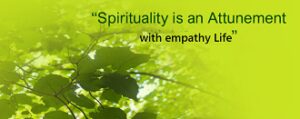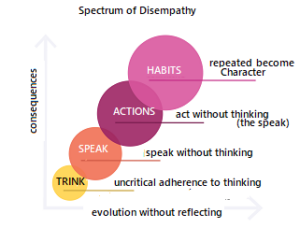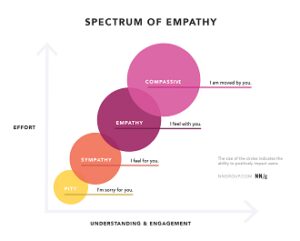
Posts Tagged ‘empathy’
Empathy: from water to wine
After clarified pathological situations, where empathy is just an instrumentation or a disguise for actions that do not contemplate the Suffering of the Other, we can affirm situations in which it is really effective and can change the situation practically as a miracle, not only in the extraordinary sense but also with high probability.
instrumentation or a disguise for actions that do not contemplate the Suffering of the Other, we can affirm situations in which it is really effective and can change the situation practically as a miracle, not only in the extraordinary sense but also with high probability.
We have already said that outside the ideological, cultural and social constraints, human nature destined to live in a collective situation tends to empathize for a good social life, it is enough to observe children when they are not yet contaminated by aggressive or toxic environments, to use a very current term.
Also social situations: work environments, neighbourhoods, small communities there is always a tendency where empathy reigns (or Love in a sense that is now forgotten) the greater tendency is that phronesis (in the sense that today they call emotional intelligence) and empathy, and this is not new, just an update is needed.
Many environments can change from water to wine if they are fully enriched and purified by empathy, there is always a greater tendency towards solidarity and tolerance than conflict and personal or group selfishness, in environments that are not enriched by a spirituality. it also weakens and tends not to prosper, because there is social pressure from outside where the environment is one of conflict and polarization.
Pandemic suffering was a great opportunity to recognize the Suffering of others, the pain of the Other, or just the face of the Other and its inclinations and concepts, what can be observed contextually is that conflicts increased and the opportunity was not properly seized, but not invalidity of joint efforts in regions and situations.
There are examples of these efforts in many places, right now the flooding situation in Bahia is a new opportunity in which many communities have joined the scourge of the region, donations and aid have come from various places in Brazil, although the central authorities have been somewhat negligent.
These are choices that we make of actions, habits and that become a “social character” if we change from water to wine, it is possible, as in that biblical passage where the wine was missing at the party, and Jesus being present receives the mother’s request to to intervene and his first public miracle happens only to give wine and improve the joy of that party, he orders three vats of 100 liters each to be filled with wine and then asks them to take it to the master of the party to taste (Jn 2,7), and he says the best wine was left for last.
So it is not the end we are living, but the beginning of a new reality, even if empathy has not arrived after so much suffering, it will come and a new clearing will open, like that of the paralytic’s passage through the ceiling that reaches Jesus to heal him. Rather, He heals him of his sins (Mk 1:5) so that he may have a more “empathetic” soul.
Empathy and spirituality
We did not point out in the previous post that phronesis is not a moral virtue, but an intellectual virtue in Aristotle’s theory, so empathy can be according to the feeling of the phronesis, a better component according to the feeling of the phronesis, the best example to explain this is that of akrasia, or the feeling and phronosis of a psychopath.
a moral virtue, but an intellectual virtue in Aristotle’s theory, so empathy can be according to the feeling of the phronesis, a better component according to the feeling of the phronesis, the best example to explain this is that of akrasia, or the feeling and phronosis of a psychopath.
Although akrasia can be projected literally because it “has no command over itself”, it is described in Plato’s speech in Protagoras, in fact it is a situation of psychopathy where he is aware of a certain actions, but does not have exactly the same a normal person’s feeling towards someone.
Something that is wrong in this counter-argument to explain phronesis is that the desire to alleviate the pain of the other in the face of suffering must be somehow protected, however it does not prevent the psychopath from cultivating some feeling for the other person’s situation and makes of attitudes in the sense of their habits and that are not defined in terms of such we have already said that this comes from thoughts become actions), if we include people who have knowledge or mercy for the suffering of others, then it can be explained.
So it is, therefore, the moral or ethical attitude, although it is, but some attitude of spiritual virtue, that is, the practice of resistance is also only in an action that is not oriented towards a. willingness to act in a moral way that can provide the means to discern about suffering along with Empathy, so one has to expand on that of moral attitudes by Aristotle.
To people who cannot be basic, but can also be able to offer in basic moral virtues, and people who can be basic, but can also be complementary, but can offer a moral virtue, many people who are basic, but who can complement the lack of a virtue. attitude your action, and this is impossible without some exercise in complete to become a habit to feel the Suffering of Others, this exercise that becomes a habit is called here Spirituality.
The phronesis cannot be exercised without basic moral virtues and thus cannot be initiated without empathy, it can be admitted that a psychopath even has empathy, many are charismatic and can influence many people, but he will lack a basic moral virtue that complements your action, and this is impossible without some an exercise to become a habit the full empathic attitude of feeling the suffering of others, this exercise that becomes a habit is called here Spirituality.
While it is not a habit, it can be an exercise in asceticism, a simulation or simply a disguise that at some point will be unveiled.
It is good to point out that there can be asceticism (elevation of the spirit partially) without true spirituality, I call it using Peter Sloterdijk’s term of “despiritualized asceticism”, that is, without a deep root that leads to the broad knowledge of what pain is. of the Other, if we want to give a name to an empathetic phronesis.
Spirituality is, therefore, an exercise that leads to an asceticism, but what is asceticism does not depend only on the belief of each one, but what during life becomes habit and character, those who do not have it can practice it for a long time. a few days, or even a few years, but without deep root it will soon leave it, like losing weight, dieting, diets and other attempts at habits that are not always maintained, to make them life they must integrate our character, our personality.
Disempathy or untraining
Of course the term does not exist (disempathy), I created it to say that it is neither antipathy nor disaffection, it is a feeling as great as the empathy that dominates the thoughts, culture and habits of a given time, as opposed to empathy, to develop the theme I take a phrase by Margareth Thatcher quoted in the film The Iron Lady (directed by Phyllida Lloyd, 2011).
that it is neither antipathy nor disaffection, it is a feeling as great as the empathy that dominates the thoughts, culture and habits of a given time, as opposed to empathy, to develop the theme I take a phrase by Margareth Thatcher quoted in the film The Iron Lady (directed by Phyllida Lloyd, 2011).
In the film Margareth Thatcher, played by Meryl Streep (Oscar deserved for best actress) says: “Watch out for your thoughts they become words. Beware that they can become actions, as they become habits. Beware of habits because they become your character”, this to understand how it is possible to detrain neurons so that they are not empathetic and become obnoxious and destructive, unfortunately we are training the opposite side to our natural empathic side.
As we said in the previous post, it is possible to train empathy, it is possible to untrain it (another neologism, something natural that is corrupted by a habit opposite to the instinctive) and induce a feeling of repulsion and hatred, even if disguised or veiled and even disguised in a form of “love” that corrects the other, we must correct everything that is not agape or empathy, but rather, the others are habits or culture.
Let’s follow the path proposed by Thatcher according to the film that intends to be a biography (no, that was the main criticism), so things start with thinking, something must already be corrected right away in contemporary theories and ideologies that say that everything would begin by the “middle”, remember the discourse of contractualists, Thomas Hobbes do Leviathan (1651) indicates that man is wolf the man, that is, he is anti-empathic, whereas John Locke (An Essay Concerning Human Understanding, 1690) defends that the individual must renounce the state of nature and make a contract (which the State regulates) and thus defends its freedom, his famous phrase: “where there is no law, there is no freedom” father of liberalism and in a way of empiricism (I think that it was born embryonic before with the vision of Francis Bacon).
Only Rousseau partly abandoned these concepts creating the “good savage”, the man is good society corrupts him, it is a principle of untraining, but he was also in favor of the contract, so it seems that handing freedom into the hands of the State is a condition “Natural”.
Thus, not only due to contractualism, but throughout the entire historical course, our thinking is linked to its contemporary roots and it is clear to what is within each culture, religion or ideological group, only through reading it is possible to detach from current thinking, and exercise to internalize takes the second step: the words.
Words like that are discourses or, as it is currently said, narratives, which are largely permeated in contemporary culture, only those who read are not linked to the flavor of this culture in its current polarization, remember that the first mental act is imitation (a neuroscience speaks of the mirror neuron), and it can be untrained, that is, it can either be taken back to its natural course of empathy or the opposite of what I have called disempathy.
It is from them that we unleash our actions, much has been said about reflection or active vitta as Hannah Arendt called it, and it was taken up by Byung Chull Han in his book The Society of Burnout, there he argues that we must also have an interior life, reflexive and so we can return to our initial course of empathy (my conclusion).
Finally, actions become habits, a good part of linguistics and semiotics starts the analysis from there, yes it is a fact that it also speaks of secondness (something that exists) and thirdness (what is), Pierce’s categories, but the theme is far and requires a greater depth which I humbly say I do not possess.
We come from habit to character, from the etymology of the word derives from the Greek “charaktér, éros”, or from the Latin “character, eris”, meaning “engraved”, therefore it is what is being carved, and it is possible to become a lack of empathy, that is, a break with the original empathic character, in the current discourse the absence of Subjectivity (proper to the subject), individualism (not looking at the Other) and a series of subcategories that are breaks with empathy.
Empathy: or what it really is
In my humble opinion, because I haven’t seen any of the readings I’ve done to assert this, the word empathy is on the rise because the word Love, in its broad meaning: eros (in the sense Byung Chul Han uses in “The Agony of Eros”), filia (in the sense of the decay of family relationships and friendships) and mainly in the sense of agape, since all the instrumentalization made by modern romantic love, read Balzac’s human comedy, turned into connections, proselytizing or of pure interest.
I’ve done to assert this, the word empathy is on the rise because the word Love, in its broad meaning: eros (in the sense Byung Chul Han uses in “The Agony of Eros”), filia (in the sense of the decay of family relationships and friendships) and mainly in the sense of agape, since all the instrumentalization made by modern romantic love, read Balzac’s human comedy, turned into connections, proselytizing or of pure interest.
Empathy, in a didactic simplification, is the ability to understand the Other as it seems, so it is inseparable from the concept of otherness in the most side of the word.
Empathy escaped these traps, from psychology to philosophy, Husserl studied it and Edith Stein went deeper into neuroscience past using it, in her article in The Atlantic Magazine entitled “A Short History of Empathy”, Susan Lanzoni claims that the word it has existed (in the current sense of course, it has Greek origins) for only a century.
A psychology with empathy I define as having 3 types: a cognitive is an intuitive corn refers to understanding how the other is and feels, an emotional and a compassionate one, it goes without saying that the emotional is also explored as emotional intelligence , the most difficult compassion to intuit is the one that goes beyond understanding and feeling the sensations of the other person, starting to mobilize to help them, but be careful, the help also has to be empathetic, that is, the one that really or other accurate and not any guesswork.
Empathic behavior is known to be natural not only in humans, but in many mammals and some birds as well, and this is actually closer to natural.
Closer because there is a totally induced natural, or consumption, different types of philosophies, theory or even religions that have little or nothing to human nature, and by extension, like nature as a whole, we are a cosmic being, broader than that we think, even though we are a spark in such a vast and mysterious universe.
Every contemporary belief, that seeing the ideas of modernity is that empathy is a new utopia, the realities that come from modern thought have induced the idea that an authoritarian state is needed, even those who deny it dream of it and say it will be “from another like”, essentially the imposition of a model of thought is an affirmation of the ego, it is the inexistence of empathy, it is the antipathy set in motion, just see the polarization this concept becomes clear.
Neuroscience and science itself show that since birth, the maternal and paternal relationship with the baby has an empathic relationship, to live in society an empathetic relationship is needed, an empathic relationship is needed to defend ourselves from the pandemic, without it there is a denial “structural”, that is, the other can die and I cannot.
The theory of neuroscience simulation, through the discovery of mirror neurons (Rizzolatti and Graighero, 2004), a type of neuron that fires when an animal acts when another animal observes and performs the same observed action, so this neuron “mirrors” the behavior of the other, as if the observer himself was acting, this is also observed in some primates and birds, I remember when smoking was allowed in the classroom when, when lighting a cigarette, several students also lit.
This theory has not only advanced neuroscience but has helped the study of some natural phenomena and some types of autism (Distein, Behrmann, 2008).
In addition to being innate, empathy can be trained, this by the most fantastic feature of our brain, which is its plasticity, that is why we are subject to auto-suggestion but also to alter-suggestion, so it could revolutionize the entire theory of self-help for a alter-help in a society focused on empathy, it took several centuries of training (I would say detraining) so that hatred, revenge and the idea that only war can solve (in part) our empathic capacity, since love -agape is in discredit whether it is for excessive labeling without content, or for the formulation of words without corresponding action.
Rizzolatti, Giacomo; Craighero, Laila (2004). “The mirror-neuron system” (PDF). Annual Review of Neuroscience. 27 (1): 169–192.O comportamento empático é conhecido como natural não somente nos seres humanos, mas em outros mamíferos e em algumas aves também.
Dinstein I, Thomas C, Behrmann M, Heeger DJ (2008). “A mirror up to nature”. Curr Biol. 18 (1): R13–8.

